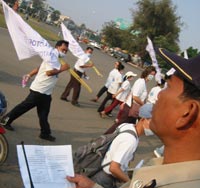Phnom Penh Municipality censors banners of human rights workers marching to highlight freedoms of assembly and expression
Published on 7 December 2004More than 300 Cambodian NGO workers marched through Phnom Penh on Monday December 6 to demand an end to nearly two years of arbitrary restrictions by government authorities on marches, demonstrations and other public gatherings.
“Freedom of assembly and freedom of expression, which are the foundation of all human rights and of a democratic society, are in serious peril in Cambodia,” said Dr. Kek Galabru, LICADHO president and chairperson of the Cambodian Human Rights Action Committee (CHRAC), which organized the march. “The government must respect and protect those rights.”
The march - timed for the start of a two-day Consultative Group (CG) meeting of international donors, who contribute about half of the whole National budget to Cambodia - drew attention to the government’s long-standing crackdown against peaceful public demonstrations, and urged the government to change that policy.
On Friday December 3, the Phnom Penh Municipality and the Ministry of Interior approved all requests by CHRAC to hold the march - a rare step for local authorities who have systematically denied civil society groups the right to hold public gatherings in recent years. However on the evening of Sunday December 5, government officials from the Phnom Penh governor's office called NGO leaders from the organizations that comprise CHRAC and insisted on reading the banners prepared for the march. All banners listing incidents where speech, assembly and demonstration were revoked or disrupted since January 2003 were rejected for the December 6 march.
Dr. Galabru stated after the march, “We believe the actions of the Phnom Penh municipality this morning, by dictating what we could and could not say, constitute censorship, were unconstitutional and are an abuse of power. Therefore we decided to open our banners once we got to the CG venue. In the end they did not stop us from exercising our rights.” The outlawed banners were then sent to donors attending the CG meeting along with the intention of the peaceful march, and a description of the last minute restrictions on speech.
Freedom of assembly and freedom of expression, which are the foundation of all human rights and of a democratic society, are in serious peril in Cambodia
In response to the restriction on certain banners, marchers from the participating CHRAC organizations wore face masks with red cross marks over their mouths, and carried the restricted banners closed over their shoulders. During the march, police officers checked to see if the open banners had slogans from the approved list. Once at Wat Phnom, the banners were unfurled and directed towards the street and the venue where the CG meeting was being held. A press conference on the unconstitutional restriction on speech followed. Police immediately ordered the signs to be taken down, however marchers refused or ignored the order.
Since anti-Thai riots in Phnom Penh in January 2003, government authorities have regularly denied permission for public marches and protests, and cracked down, often violently, on those that have been held without authorization. Those who have been refused permission, usually on the grounds that they would pose a threat to public order or national security, include: a group of monks planning a 640km peace march that passed through Phnom Penh; women’s NGOs and domestic violence victims wanting to meet parliamentarians at the National Assembly to discuss a draft law against domestic violence; and anti-corruption NGOs seeking to hold a rally for International Anti-Corruption Day.
Police have broken up demonstrations which have occurred without permission, as well as labor strikes by factory workers and others, with dozens of people being beaten or detained. Most recently, unknown persons threw a grenade at villagers protesting a land concession in Pursat province, injuring eight people. The police immediately suggested the protesters had thrown the grenade at themselves; no one has been arrested for the attack.
The controversial 1991 Law on Demonstrations prohibits marches or demonstrations which affect “public tranquility, order or security”. Local authorities must be informed in advance of marches, and can ban them if the event is deemed likely to cause “turmoil”. According to a recent CHRAC report - which documents 35 incidents of marchers, demonstrators or strikers being prevented from gathering or being dispersed by police since January 2003 - supposed security concerns are being “grossly manipulated by the authorities in order to impose a sweeping and routine denial of the right of assembly”.
This march was also conducted in support of the Civil Society Forum on the NGO statement to the Consultative Group (CG) meeting held at Sunway Hotel on 30 November 2004 that provided key recommendations including: enhancing public participation, eradicating corruption, supporting the rule of law and reducing poverty in rural areas.
- Topics
- Expression/Assembly








